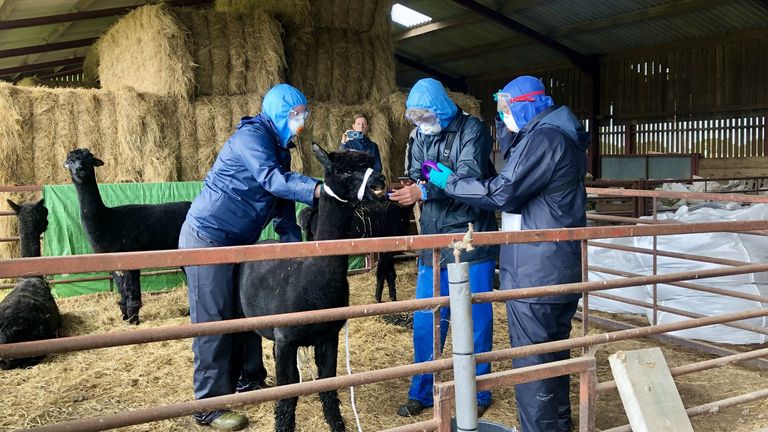Geronimo the alpaca killed by government vets ‘to prevent spread of disease’
Geronimo the alpaca has been killed by vets under orders from the government.
The animal was put down after being taken from its farm in Gloucestershire, days before a destruction warrant ordering its death was due to expire on 4 September.
The alpaca had twice tested positive for bovine tuberculosis.
A statement by the government said: “bTB-positive alpaca known as ‘Geronimo’ has been euthanised to prevent the spread of disease.”
Chief veterinary officer Christine Middlemiss called it a “terribly sad situation” and said “our sympathies remain with all those affected by this devastating disease”.
She added: “No one wants to have to cull infected animals if it can be avoided, but we need to follow the scientific evidence and cull animals that have tested positive for bTB to minimise spread of this insidious disease and ultimately eradicate the biggest threat to animal health in this country.
“Not only is this essential to protect the livelihoods of our farming industry and rural communities, but it is also necessary avoid more TB cases in humans.”
Downing Street has expressed sympathy for the animal and its owner Helen MacDonald, who has been fighting to save it for the last four years.
The prime minister’s official spokesman said: “It’s obviously highly distressing for someone to lose animals to TB and that’s a situation that farmers sadly have to face.
“Our sympathies are with Ms Macdonald and any others that are affected by this terrible disease.”
Earlier, Avon and Somerset Police officers arrived at the site in Wickwar, South Gloucestershire alongside three people dressed in blue overalls, masks and goggles.
The force later confirmed it was supporting the Animal and Plant Health Agency (APHA) in executing a court warrant.
Other alpacas on the farm, which are not in the same pen, gathered nearby after the officers arrived before running off to another part of the farm.
While officers were there Ms MacDonald tweeted further pleas to save the animal.
She posted: “DEFRA have arrived! We are asking once again for an urgent meeting with George Eustice. Please don’t execute Geronimo” and “@BorisJohnson STOP THIS NOW GERONIMO IS HEALTHY.”
Supporters have been camping out at the farm for weeks in case officials from the Department of Environment, Food and Rural Affairs (Defra) arrived to destroy the alpaca.
Some spoke to officers this morning. One woman was briefly arrested after spraying officers with a water pistol, but was quickly de-arrested.
A force spokesman said: “We can confirm officers are in attendance at a farm in the Wickwar area of South Gloucestershire this morning to support the Animal and Plant Health Agency, who are executing a court warrant.
“We’ll always support our partner agencies to carry out their lawful duties, and our role is to prevent a breach of the peace and to ensure public safety is protected.”
Ms Macdonald’s legal fight to save her animal has been going on since the alpaca first tested positive for bovine tuberculosis in September 2017.
Owner Helen Macdonald claimed the test was flawed.
She has long argued that the Enferplex test is fundamentally flawed and says Geronimo tested positive because he had repeatedly been primed with tuberculin – a purified protein derivative of bovine TB bacteria.
The veterinary nurse, who farms alpacas at her home, has received support from around the world – with more than 140,000 people signing a petition against Geronimo’s destruction.
Earlier this month, a High Court judge refused her lawyer’s application for a temporary injunction to stop the destruction order and reopen the case.
As well as alpacas, badgers have been a victim of the fight against bovine TB, with mass culling employed to stop the spread since 2013, sparking a huge public backlash.
Defra said a post-mortem examination of Geronimo will now be carried out by veterinary pathologists from the APHA, followed by a bacteriological culture of selected tissue samples, which can take up to three months to process.
Source: Read Full Article





